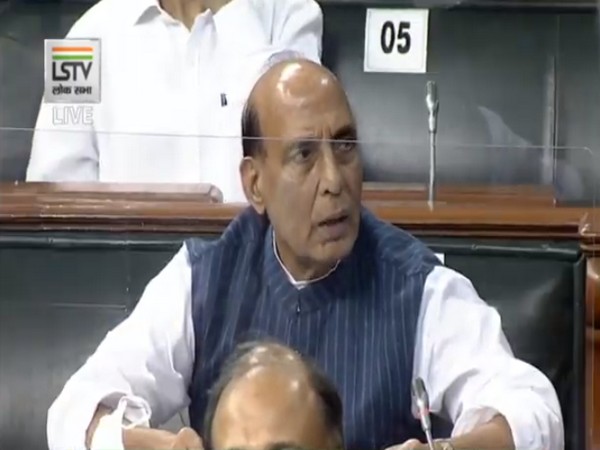China disrupted traditional patrolling pattern of Indian troops in Galwan Valley causing face-off conditions: Rajnath
Defence Minister Rajnath Singh on Tuesday said that China began disrupting the normal and traditional patrolling pattern of Indian troops in the Galwan Valley in May this year causing face-off conditions between the two Armies.

- Country:
- India
Defence Minister Rajnath Singh on Tuesday said that China began disrupting the normal and traditional patrolling pattern of Indian troops in the Galwan Valley in May this year causing face-off conditions between the two Armies. "From April, the number of Chinese armies and their armaments on the border of Eastern Ladakh was observed. Early in the month of May, China began disrupting the normal, traditional patrolling pattern of our troops in the Galwan Valley region, causing face-off conditions. Ground commander level meetings were also being held," Singh said while speaking in Lok Sabha today.
"Meanwhile, in mid-May, China made transgression attempts on Line of Actual Control (LAC) in the western sector. This includes Kongka, Gogra, and the north bank of Pangong Lake. Our Army took necessary action against these attempts. We conveyed to China through diplomatic and military channels that such activities are an attempt to change the status quo unilaterally. It has also been made clear that this effort is not acceptable to us under any circumstances," he said. Singh said that the violent face-off that took place on June 15 in which 20 Indian soldiers laid down their lives was created by China as it violated the consent reached in a meeting between military commanders on both sides on June 6.
"Seeing increasing friction on the LAC, military commanders on both sides met on June 6, 2020. It was agreed that disengagement should be done by reciprocal actions. Both sides also agreed that LAC would be considered and no action would be taken which would change the status quo," Singh said. "A violent face-off situation was created by China in Galwan on June 15 in violation of this consent. Our brave soldiers sacrificed their lives but also caused great damage to the Chinese side and managed to protect their border," he continued to say. "I request the House to join me in praising the valor and bravery of our soldiers. Our brave soldiers are keeping all the countrymen safe by their tireless efforts in extremely difficult circumstances."
He also requested the Lok Sabha to pass a resolution that we stand shoulder to shoulder with our armed forces who are guarding our borders to safeguard India's sovereignty and integrity. "As this House is aware, China has an unauthorised occupation of approximately 38,000 square kilometres of land in Ladakh. Also, under a so-called Boundary-Agreement in 1963, Pakistan illegally handed over 5,180 square kilometres of Indian land of PoK to China. China also claims around 90,000 square kilometres of land adjacent to Arunachal Pradesh's border," he continued.
The Defence Minister said that India and China have formally recognised that the boundary question is a "complex" issue and it requires patience to resolve and reach a "fair, reasonable, and mutually acceptable solution" to the issue, by "peaceful negotiation". "It is also to be mentioned that as of now there is not a generally delineated LAC in the border areas of India-China and both have different perceptions about LAC," Singh said.
"Therefore, there are several agreements and protocols between the two countries to restore peace and tranquillity. Under these agreements, it is assumed that peace and tranquillity will be restored on the LAC, which will not be considered to have any effect on the respective positions and boundary question of the LAC," he said. He further went to say that India believes that bilateral relations can be "developed", as well as a discussion of resolving the boundary issue.
"But any serious situation in peace and tranquillity on the LAC will definitely have an impact on bilateral relations. In the 1993 and 1996 agreements, it is mentioned that with the LAC, the two countries will keep the number of their armies to a minimum. The agreement also states that until the boundary issue is fully resolved, the LAC will be strictly respected and followed and will not be violated. In these agreements, India and China were also committed to reaching a common understanding by clarification of LAC," he said. The two countries have been engaged in a standoff since April-May and the Chinese have refused to vacate locations in the Finger area and other friction points in the Eastern Ladakh area.
Multiple rounds of talks have also failed to yield any significant result in defusing the tensions and now the Indian side has prepared itself for a long term deployment in the high mountainous region. (ANI)
(This story has not been edited by Devdiscourse staff and is auto-generated from a syndicated feed.)
ALSO READ
PM Modi to kick off NDA's Lok Sabha poll campaign in Bihar on Thursday
Kerala: Congress' KC Venugopal files nomination for Lok Sabha polls from Alappuzha
Delhi Police crackdown on criminals ahead of Lok Sabha polls; 264 booked
PM to kick off NDA's Lok Sabha poll campaign in Bihar on Thursday
Lok Sabha Elections: JDS-BJP candidate HD Kumaraswamy files his nomination from Mandya










